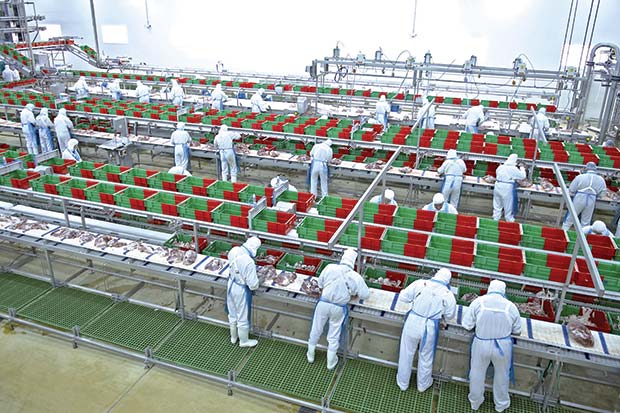Businesses are always looking for the latest ways to reduce expenditure and ensure they are meeting their goals for reduced carbon footprint and this isn’t any different for the food industry. One way companies can meet targets is through an expert site survey, where a full audit of the supply chain is undertaken by a specialist in food and fresh product logistics. Schoeller Allibert’s National Field Sales Manager, Stephanie Carr, explains how the food industry can benefit from the site survey process.

Site surveys are based on a full review of a customer’s supply chain. From inbound supply, manufacturing and on-site handling, to vehicle fill and outbound delivery, the site survey is tailored to each operation thus playing a crucial role for businesses in all sectors, including the food industry.
Food surveys: the five key considerations
Plastic trays and containers play an important role in the food sector, especially when considering the agri-food market where the use of such products is higher than any other industry. With stringent hygiene targets to meet, where food companies can’t risk products becoming contaminated or damaged, it is essential that all parts of the supply chain, from field to retail point-of-sale, are performed to the highest standards.
Site surveys can therefore play an integral part in ensuring these strict guidelines are met in the most efficient way possible. Within the food industry, there are five key considerations when undertaking a site survey: hygiene, quality, speed, cost and reduced waste.
Hygiene is always the top priority for the food industry. Optimising hygiene while preventing risk of contamination is at the forefront of all food operations and site surveys aid in the identification of process points which present potential risks. One way site surveys can help ensure the most hygienic methods are being adhered to in the supply chain is through the introduction of labelling. Labelling options help users identify contents and destinations, including visibility over when the tray was last washed.
Site surveys also look at how best to maintain quality in all areas of the supply chain, helping to promote the longevity of fresh produce and food products. Additionally, they can ensure containers are manufactured in food-safe material for customers to receive the best benefits for their individual needs. For the food industry, this could mean the introduction of ventilated crates for washing fresh produce, which eliminates the need to decant, as well as promoting air circulation to ensure produce stays fresh for longer periods.
Speed of handling operations can also be increased as a result of a site survey, as RTP is fast and easy to handle by both operatives and automated handling systems.
Reducing costs is often the main goal for food companies when requesting a site survey. This is achieved through a variety of solutions, such as the introduction of long-lasting products which can have a service life of five to ten years. This is not only cheaper than repeatedly buying single-use packaging per kilo, but it is also becoming the preferred choice across the industry. Additionally, the use of foldable or nesting crates help save space on return journeys, optimising vehicle fill and therefore reducing costs, as well as cutting emissions by using fewer vehicles.
Site surveys can also help find ways for companies to minimise their food waste. A site survey can help food companies find transit packaging to better protect delicate produce, meaning food isn’t damaged and wasted, and recommend solutions to speed the chilling process, so that food maintains its quality for longer.
Reduced carbon footprint
One of the biggest benefits of optimising a supply chain’s savings is carbon footprint reduction. By utilising the option of a full audit, companies can receive guidance on how to reduce carbon emissions improving their environmental responsibilities.
Site surveys can help reduce carbon footprint through a calculation of the difference between using returnable transit packaging (RTP) or more traditional, single-use materials. Indeed, the reusability and recyclability of RTP means that it is becoming the preferred choice of manufacturers in the food industry, playing an important role in a company’s sustainability strategy.
Additionally, logistic and handling calculations can be made through site surveys, creating awareness of the benefits of utilising the suggested products and how they are calculated. Maximising a vehicle’s capacity is another method of reducing carbon footprint by cutting the number of trips required to deliver products, allowing for a minimal impact on the environment, while also reducing associated costs.
Tailor-made solutions
Site surveys from Schoeller Allibert ensure the right RTP solutions are recommended to each customer. Along with the largest product range available in the UK, Schoeller Allibert’s R&D team can design a product tailored to the customer’s specific needs. Site surveys provide food businesses with the opportunity to identify any risk that may affect the quality of the product, such as contamination, as well as include ways to save money, time and reduce carbon footprint.




Comments are closed.